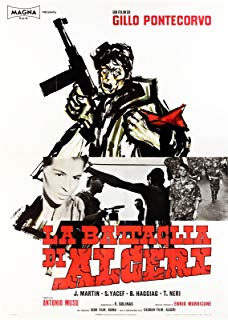電影訊息
阿爾及爾之戰--The Battle of Algiers
編劇: 傑羅‧龐泰科法 Franco Solinas
演員: Brahim Hadjadj Jean Martin Yacef Saadi Samia Kerbash
阿尔及尔之战/阿尔及利亚的战争/TheBattleofAlgiers
導演: 傑羅‧龐泰科法編劇: 傑羅‧龐泰科法 Franco Solinas
演員: Brahim Hadjadj Jean Martin Yacef Saadi Samia Kerbash
電影評論更多影評

2014-04-02 10:52:55
分割與暴力
Compartmentalization and Violence
「The colonized world is a compartmentalized world.」(Fanon, 3) This statement rings as a precursor to the decolonized world we live in today. As we proudly stress that the age we live in is characterized by globalization, compartmentalization sounds foreign to us. Yet it dominated the global landscape just a few decades ago, causing seismic waves throughout the colonized world and changed the world as we know it.
What does it mean to live in a compartmentalized world? The film 「Battles of Algiers」 explains it by exposing the unapologetic violence that filled the city during the revolution. People living in Algiers were all aware that the city was divided in two ---- the European Quarter and the Casbah. The story of Ali La Pointe begins with him being chased by police and tripped by a young French man on the streets of the European Quarter. We can already see the tension between the two groups. And although the young man trips Ali apparently 「for fun」, there is undeniably something unsettling about an Algerian man running down the street that prompts him to do so. In Fanon’s words, 「the colonist is an exhibitionist」(17) and they feel the need to assert their power over the colonized.
And this need of assertion of power does not come ungrounded. Given the nature of colonization, the colonists 「always remain as foreigners」(5). And the only way to obtain his right to govern is through unmasked oppression. The colonized are thus never made to be equals to the colonists from the very beginning, they can only be oppressed and exploited so that the colonists, the foreigners, can retain their power to rule. However, this relationship of the oppressor and the oppressed can never last since the oppressed ultimately wants to take the land to their own hands. Because after all, the land 「provides the bread」(9). But how should they go about taking their land back?
In the film, the FLN states in their first communique that they want a negotiation with the French to avoid bloodshed. And we can only assume the French would even less likely want war since it is the colonized who has nothing to lose. Only with an ordered society and a healthy market can the French benefit from colonization. Yet even with peaceful intentions, the two still ended up in a full-blown war. This leads us to question if decolonization is 「always a violent event」(1). Fanon makes it very clear that since decolonization is essentially 「the substitution of one 『species』 of mankind by another」, violence is unavoidable since no one wants to be substituted. This is clearly seen in the film during the interview of Col. Mathieu. When asked about the torture methods used in interrogations, he asks the journalists, 「Should France stay in Algeria?」 If their answer is still yes, then there is no choice but to 「accept all the consequences」.
We immediately find out what the consequences are. In a whirlwind of brutal torture, threats and gunfire, FLN is torn apart piece by piece by the French army. It all seems to be over when Ali, the last man standing, is blown up into pieces. Yet the film does not end there, because the compartmentalization, the root of colonial struggle, does not end there. As long as the city, as well as the country, is still divided into two, the conflicts remain.
The film takes a dramatic turn at the end when Algerian people rise up once again after two years of silence. One striking feature is the ululation the women make. It is nothing violent, yet it sounds so powerful because it symbolizes the unity of the Algerian people. It is almost that everyone is now Ali La Pointe and they all decide to unite and fight. The film ends with an empowering image of a woman spinning her Algerian flag around while resisting the police. And it is at that moment that we realize no matter how violent decolonization may be, it is not achieved through violence.
This fundamentally decides who wins the war. While the French, represented by Col. Mathieu, thinks that violence and explosions are the only ways to go if France is to stay, FLN figures out long ago that 「acts of violence don』t win wars」(Battle of Algiers). They understand that decolonization is not about killing people, it is about uniting the people. This explains why they organize the general strike. A strike, as a peaceful act that bans the use of arms, does give the French a military advantage, but moreover it unites the people of Casbah. While the French are satisfied that they finally have the right to arrest and interrogate people of Casbah, they do not realize that their enemy has just grown bigger and stronger as well. While the FLN is exposed and seemingly destroyed by the French, they cannot foresee a greater and more powerful FLN rising that is the Algerian people.
And this is when the French realizes that 「a Dien Bien Phu is now within reach of every colonized subject」(31). And even winning the war does not mean they are welcome to stay in Algeria. They have no choice but to leave now. Thus, we see not only Algeria, but the entire continent of Africa emerging from the century-long colonization and now proudly waving their own flags. What made the colonists leave was not violence ---- they were at the upper hand militarily after all---- it was the terrifying power of unity, that stirring sound of ululation heard at night.
Works Cited:
Frantz Fanon. The Wretched of the Earth. 紐約: Grove. Print.
The Battle of Algiers. Dir. Gillo Pontecorvo, 1966. Film.
評論

